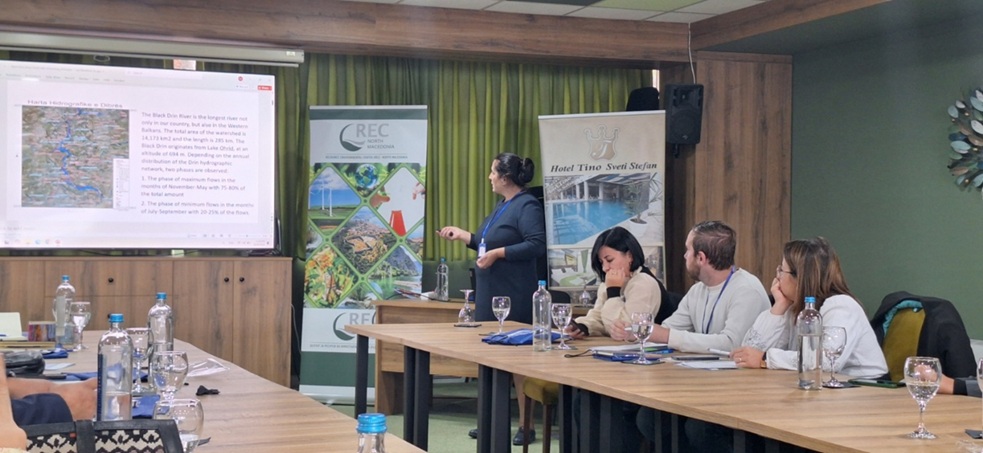On October 8–9, 2025, representatives from FLOROZON – Center for Environmental Democracy took part in the Fourth Regional Training “Strengthening Capacities to Reduce Watershed Instability in the Western Balkans”, held in Ohrid, North Macedonia. The event brought together representatives of municipalities, experts, and civil society organizations from across the region to exchange experiences and discuss common challenges in sustainable watershed management.
The two-day training focused on a wide range of topics, including the impacts of watershed instability, best practices in watershed stabilization, and the policy and institutional frameworks that influence local-level water management. Participants worked to identify local risks and instability hot spots, while also exploring opportunities for cooperation and knowledge sharing between municipalities and civil society organizations.
An important part of the agenda included the presentation of activities from the sub-granting schemes implemented in Albania, Bosnia and Herzegovina, and North Macedonia, which showcased practical local actions and community-led initiatives aimed at improving watershed resilience. Participants also discussed the development of local action plans, exchanging valuable insights on both successes and challenges encountered in different contexts.
The discussions concluded with a shared understanding that achieving tangible improvements in watershed management across the Western Balkans requires strong regional networking and cooperation. Municipal and NGO representatives emphasized that continuous exchange of information, technical know-how, and good practices is key to building resilient communities capable of addressing environmental and climate-related risks.
On October 9, the training continued with a study visit to the natural springs of St. Naum, where participants discussed environmental “hot spots” and “green spots” in the Ohrid area. The visit also included the village of Trpejca, uniquely located on a landslide-prone area, providing an illustrative case study of the challenges of terrain instability and the need for nature-based solutions in watershed protection.
The regional training was organized within the framework of the project “Rapid Watershed Assessment for the Western Balkans – Phase II”, financed by the U.S. Forest Service, the U.S. Department of Defense EUCOM, and the Forest Service International Foundation.
Through this initiative, FLOROZON continues to contribute to strengthening regional cooperation and local capacities for sustainable watershed management — promoting environmental resilience and responsible stewardship of natural resources across the Western Balkans.
The two-day training focused on a wide range of topics, including the impacts of watershed instability, best practices in watershed stabilization, and the policy and institutional frameworks that influence local-level water management. Participants worked to identify local risks and instability hot spots, while also exploring opportunities for cooperation and knowledge sharing between municipalities and civil society organizations.
An important part of the agenda included the presentation of activities from the sub-granting schemes implemented in Albania, Bosnia and Herzegovina, and North Macedonia, which showcased practical local actions and community-led initiatives aimed at improving watershed resilience. Participants also discussed the development of local action plans, exchanging valuable insights on both successes and challenges encountered in different contexts.
The discussions concluded with a shared understanding that achieving tangible improvements in watershed management across the Western Balkans requires strong regional networking and cooperation. Municipal and NGO representatives emphasized that continuous exchange of information, technical know-how, and good practices is key to building resilient communities capable of addressing environmental and climate-related risks.
On October 9, the training continued with a study visit to the natural springs of St. Naum, where participants discussed environmental “hot spots” and “green spots” in the Ohrid area. The visit also included the village of Trpejca, uniquely located on a landslide-prone area, providing an illustrative case study of the challenges of terrain instability and the need for nature-based solutions in watershed protection.
The regional training was organized within the framework of the project “Rapid Watershed Assessment for the Western Balkans – Phase II”, financed by the U.S. Forest Service, the U.S. Department of Defense EUCOM, and the Forest Service International Foundation.
Through this initiative, FLOROZON continues to contribute to strengthening regional cooperation and local capacities for sustainable watershed management — promoting environmental resilience and responsible stewardship of natural resources across the Western Balkans.





